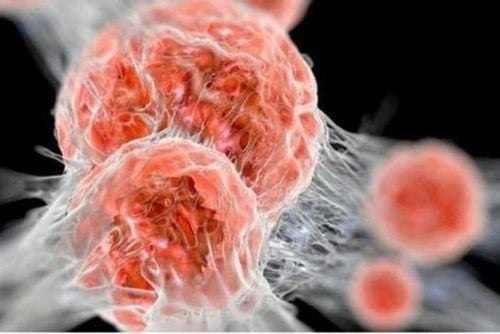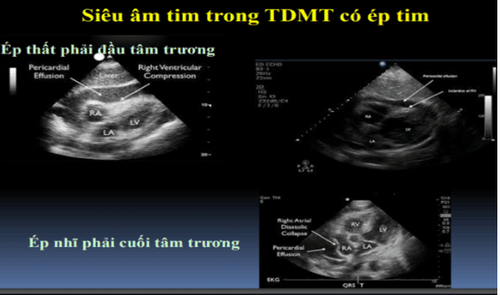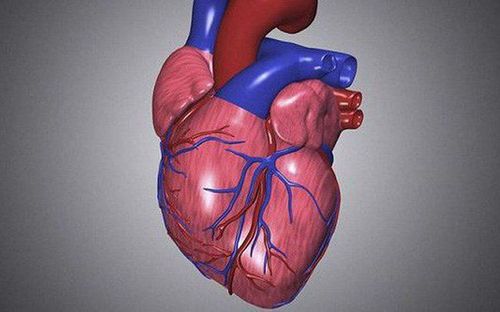This is an automatically translated article.
The article was professionally consulted by Dr. Nguyen Van Duong - Interventional Cardiologist - Cardiovascular Center - Vinmec Central Park International General Hospital. The doctor has many years of experience in the diagnosis and treatment of cardiovascular diseases.Cardiac tumors are abnormal masses of cells that form in the heart, in the myocardium, or outside the heart wall, which can be primary or secondary. In which mucinous tumor is the most common primary tumor, benign of the heart, malignant tumors are rarer with less than 10% of primary cardiac tumors.
1. Common types of benign tumors in the heart
There are many types of benign tumors in the heart found in children, the most common are Rhabdomyomas and Fibromas, there are also other types of benign tumors such as: Myxomas, teratomas, lipomas,...Rhabdomyomas: a type of tumor develop in the myocardium or endocardium, often consisting of many small tumors, are common in children under 1 year of age and cause no symptoms, sometimes with heart murmurs, arrhythmias, or heart failure. Fibromas: are tumors that grow in the myocardium and endocardium, usually affecting the left ventricle, when the tumor grows, it can invade the mitral and aortic valves, causing obstruction or regurgitation. This form of tumor is common in children under 6 years of age and requires surgical intervention Myxomas: tumors in the atria, more common in adults Teratomas: usually form in the heart chambers Lipomas: tumors of fatty tissue While Myxomas are the most common primary tumors in adults, accounting for half of all benign cardiac tumors and can occur in all ages and genders. Most cardiac mucinous tumors exist alone, the most common location being in the left atrium, attached to the atrial septum near the foramen ovale. Cardiac mucinous tumors arise from the endocardial surface at any location, so they can be found in other chambers of the heart or on the valves of the heart.

2. Symptoms of Benign Heart Tumor
The development of symptoms of heart disease depends on the location of the tumor as well as the size of the tumor. Sometimes a heart tumor may not cause any symptoms or cause symptoms similar to those of congenital heart disease or heart failure, such as heart failure or arrhythmia.For mucinous tumors, clinical manifestations of the disease include classic triads secondary to mucinous tumors, including:
Heart failure due to valvular obstruction Embolic stroke Symptoms similar to rheumatic heart disease secreted by the tumor Inflammatory cytokines such as IL-6 The most common clinical presentation of cardiac mucinous tumors resembles mitral valve disease, usually mitral stenosis due to prolapse into the mitral valve during diastole or regurgitation if the valve is damaged. damage caused by the tumor.
Rare ventricular mucinous tumors can obstruct the ventricular outflow tract, mistaking it for subaortic or subpulmonary stenosis. Auscultation may reveal a low-intensity murmur heard in early or mid-diastole. Cardiac mucinoma can also cause some of the following symptoms:
Syncope, transient ischemic attack, or embolic stroke Peripheral or pulmonary embolism Extracardiac symptoms such as fever, weight loss, fatigue , weakness, arthralgia, rash, anemia, polycythemia vera, leukocytosis, increased erythrocyte sedimentation rate or thrombocytopenia. Mucinous tumors have no risk of malignant transformation.
3. How is a heart tumor diagnosed?
In addition to the symptoms of a heart tumor that can cause, to diagnose a heart tumor must also rely on supportive laboratory tests such as:Blood tests: blood cultures to assess the possibility of endocarditis X- Cardiopulmonary radiograph: usually undetectable, in some cases with enlarged heart or mediastinum, cardiac calcifications may be characteristic of fibromas (especially in children) Echocardiography: possible is the best diagnostic test to evaluate patients with a history or clinical suggestive of valvular dysfunction or the possibility of a cardiac tumor. Ultrasound can also differentiate tumor properties, location, morphology and motility. However, it is not possible to distinguish between benign and malignant tumors, so further histopathological diagnosis is needed to confirm. CT Scanner: evaluates the possibility of intrathoracic malignancy and may suggest a primary cardiac tumor but is less diagnostic than a thorough echocardiogram.

4. How are benign heart tumors treated?
Regarding medical treatment: not indicated in the absence of symptoms, tumor size may allow resection. In non-surgical patients who require consultation for an electrophysiological evaluation of the heart because of the risk of malignant ventricular arrhythmias, physicians may consider prophylactic medication or defibrillator pacingAbout treatment Surgical treatment:
Total surgical resection of benign tumors is a cure-all treatment, so it should be treated early because of the high risk of dangerous arrhythmias. In addition, heart transplant can be indicated in cases of large unresectable tumors
To protect cardiovascular health in general and detect early signs of cardiovascular disease, customers can register Sign Cardiovascular Screening Package - Basic Cardiovascular Examination of Vinmec International General Hospital. The examination package helps to detect cardiovascular problems at the earliest through tests and modern imaging methods. The package is for all ages, genders and is especially essential for people with risk factors for cardiovascular disease.
Please dial HOTLINE for more information or register for an appointment HERE. Download MyVinmec app to make appointments faster and to manage your bookings easily.














